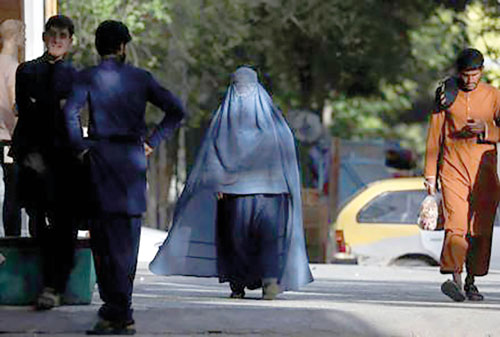A UN expert said on Monday that human rights had deteriorated under the Islamic Emirate, describing a “staggering repression” of women and girls and a “descent towards authoritarianism”, while Afghan women urged the global body to act.
Richard Bennett, the U.N. Special Rapporteur on the situation of human rights in Afghanistan, called for radical changes in the country.
“The severe rollback of the rights of women and girls, reprisals targeting opponents and critics, and a clampdown on freedom of expression by the Islamic Emirate amount to a descent towards authoritarianism,” he told a Human Rights Council meeting.
The Islamic Emirate’s Spokesman Zabiullah Mujahid in a statement called Bennett’s comments “biased and far from reality,” saying that the rights of women, minorities and human rights are currently protected in the country.
“Going through the report, it is obvious how clearly this big international organization is being misused and wrong information is being published on its address??! We condemn and call it regrettable that irresponsible and controversial statements are being published at the address of the United Nations against Islamic Emirate,” the statement reads.
Afghanistan Ambassador Nasir Ahmad Andisha, who represents the toppled government went further, describing a “gender apartheid” in the country.
Several Afghan women addressed the same meeting, including rights activist Mahbouba Seraj, who urged the 47-member council to set up a mechanism to investigate abuses.
“God only knows what kind of atrocities are not being reported,” she told the room full of UN diplomats in Geneva. “And I want that to be reported because this is not right. World: this is not right. Please, please, you’ve got to do something about it.”
She described encountering an Islamic Emirate official in the streets of the capital Kabul and feeling invisible: “I don’t exist in front of him. Not me. All of us, the women of that country. We don’t exist. He just looks at us and then that’s it. We are erased. Do you know what that feeling is? To be erased?”
Most girls’ secondary schools in Afghanistan have been closed since the Islamic Emirate took over in August 2021 after the group made a sudden U-turn on promises to open them in March.
Assistant Secretary-General for Human Rights, Ilze Brands Kehris, said that some 850,000 girls had so far dropped out of school, placing them at risk of child marriage and sexual economic exploitation.
The Islamic Emirate, whose administration is not officially recognized by many governments, has said that schools will remain closed until a plan is drawn up in accordance with Islamic law for them to reopen.
The mandate to monitor human rights violations in Afghanistan was established by the Geneva-based council almost a year ago. A draft resolution by the European Union seeks to renew it and a decision is expected by Oct. 7.










